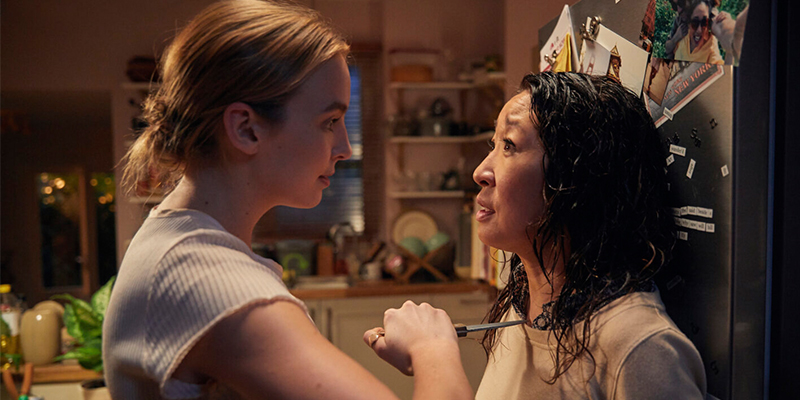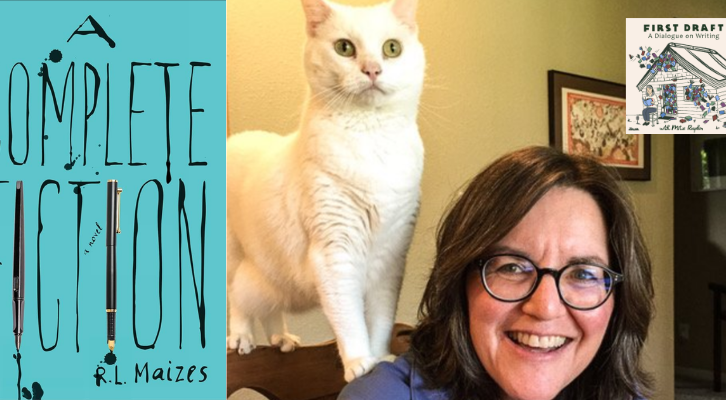Much has been written about Villanelle, the mischievous, fashionable millennial murderer at the center of BBC America’s beloved series Killing Eve. Villanelle (Jodie Comer) contains multitudes: she is spunky and surly, mischievous and malicious, sardonic and sentimental. Mostly, though, she’s self-obsessed, in constant pursuit of a lifestyle which affords her the maximum amount of enjoyment.
Villanelle is a psychopath, employed as an assassin by an international criminal organization which pays her well—allowing her to have the highly stylish life she wants. But killing people is not only her job, it is also her pleasure; throughout the season, she resembles an assassin less than a serial killer. And her flamboyant, creative murders catch the eye of Eve Polastri (Sandra Oh), a flustered MI6 agent with whom Villanelle becomes infatuated. As the show progresses, Eve becomes as obsessed with the idea of catching Villanelle as much as Villanelle becomes obsessed with the idea of Eve catching her.
Season One plays with a cat-and-mouse template, with Eve chasing Villanelle while Villanelle tries to get as close as possible to Eve without risking capture. The Second season draws the two women together more directly than the first, allows them to have the romantic and sexual relationship teased throughout Season One. Season Three splits the women apart again and shows them each attempting to live lower-profile lives independently, and Season Four offers Villainelle the dangling carrot of moral redemption.
But I want to dwell on Season Two for a bit. These women have to work together, it turns out, to handle another female assassin hired by the criminal organization that has by now effectively sacked Villanelle. While the fatigued and stressed Eve has grown accustomed to Villanelle’s histrionics, she is startled to find that the new killer is Villanelle’s antithesis: stealthy, pristine, minimalist, and effectively invisible. For these reasons, Eve’s team nicknames this killer “The Ghost.” And the addition of the Ghost becomes essential in illuminating one of the show’s key practices: dividing all its female characters into two camps—women who stand out in crowds, and women who blend in.
This organization is one aspect of Killing Eve’s larger investment in reading female power as directly related to noticeability. The show offers the (sad) determination that women who are the most glamourous also achieve the most power. But beyond this, specifically by arranging Eve and Villanelle as opposites, the show is able to redefine what “glamour” and “visibility” actually derive from—an appreciation of, and instinct to preserve, the self above all else. Villanelle lives in a “chic as shit” Parisian apartment (Eve’s words), owns a giant wardrobe of exquisite clothes, and has endless photoshoot-ready hairstyles.
The most fundamental breakdown between the two women in Killing Eve is that Villanelle constantly practices “self-care” while Eve absolutely does not (it might be said that Eve herself, with her sacrificially-intense work ethic, is what’s killing Eve). Killing Eve renders self-care (in all its forms, from skincare routines to wearing beautiful clothes) as a kind of high-stakes gamesmanship—one that ensures attention, which then allows for manipulation, control, and power.
Simply, characters who garner the most attention for being put-together and fashionable are the show’s most commanding. One such woman is Eve’s indomitable boss, Carolyn Martens (Fiona Shaw) a steely-eyed, elegant executive who wears unwrinkled blouses and impeccable car coats. When seeing Carolyn one morning before a meeting, Eve blurts out, “How do you always look so good? I mean, do you even sleep?” Without missing a beat, Carolyn offers, in complete deadpan: “It’s my moisturizer. It’s made of pig’s placenta. Costs a fortune, smells like arse, but it is exceedingly effective.” Then she turns and walks away.
Like Villanelle, Carolyn values her own aesthetic, enough to use a disgusting, expensive product in order to perfect herself. And Carolyn’s demystification of her beauty routine is additionally a power move—in breaking down how she is able to look so good, she dwells on the product’s qualities that would prevent its mainstream assimilation. Carolyn’s particular visibility is clearly linked to her status, and reminds Eve that Carolyn is above her.
The show reveals the (exhausting) labor and complicated measures taken by women to attempt to become their most “glamorous,” but it plays with “glamour” as appearing effortlessly attainable for some while seeming strenuous and obtuse for others—revealing, by these different levels of participation, a cultural reading of power accessibility. True female power, the show interprets, lies in the ability to naturally appear alluring—and this is highly desirable. “I don’t mind smelling like arse,” Eve calls to Carolyn from behind her, after Carolyn describes the moisturizer and walks away. “I’ll send you the link,” says Carolyn casually.
When Villanelle is in Amsterdam, relaxing at a table overlooking the water, wearing a light pink shirt tied at her midriff and a sweeping tapestry of a skirt, which she’s paired with a pair of large gold earrings, she is approached by a well-dressed young woman, who tells her she looks amazing. “Can I take a picture of you for my Instagram?” the woman asks Villanelle. “No, of course not,” Villanelle barks, sending the woman away.
Extravagant and photogenic as she is, Villanelle dresses for herself, alone. The show features countless shots of her, triumphant after completing a job, carrying designer shopping bags, and trying on her spoils—but these constitute her everyday wear, including what she wears when she’s totally by herself. But it is only by wanting to look spectacular for one’s own satisfaction and pleasure, as Villanelle does, that true glamour, and corresponding power, will grow.
Villanelle easily attracts the attention of Aaron Peele (Henry Lloyd-Hughes), a suspect she and Eve are surveilling, precisely by negging him—she doesn’t seem to care about him, so he grows obsessed with her approval. In Lit Hub, Rachel Vorona Cote has analyzed Villanelle as a kind of “cool-girl” “Instagram-influencer” personality, but Villanelle rejects the actual promotion of herself—the labor of asking for attention. Her power comes from the fact that she draws attention, seemingly without having to try to be noticed.
In this reading about which women have access to power, the show is wise to connect “visibility” beyond simple fashion and a corresponding illusion of effortlessness, to race, class, and accordingly, effort. The women who are not noticed are working women of color, while the women who are noticed, and receive capital for this, are exclusively white and wealthy. The Ghost (Jung Sun den Hollander), like Eve, is Asian. When building a profile on the anonymous killer, Eve suggests, “We’re working on the assumption that this is a woman, late to middle-age, looks like an immigrant worker, so, you, know she’s not white…” Her much-younger colleague Hugo, a white man, cuts her off to ask, “What makes you think that?” Eve responds, “The fact that you just interrupted me, mid-sentence, makes me think that.”
Eve’s daily existence as an Asian woman provides insight into the Ghost’s identity—but it also allows her to identify with her slightly. The Ghost, Eve says is “the kind of woman people look at and never see.” They are the “invisible” women in this exclusive world of espionage. Eve is even able to help capture the Ghost through this identification, by speaking near her in Chinese, to form a bond enough for Eve to approach her and chat. Later, to sneak into a high-security home in an emergency, Eve dons a cleaning woman’s uniform and only speaks in Chinese. No one notices her.
Moreover, Eve and the Ghost—as well as Eve’s two colleagues, Jess (Nina Sosanya, in Season 2) and Elena (Kirby Howell-Baptiste, in Season 1), who are both black—are singled out among the other women in the show for being practical, responsible, and utterly professional. They use these qualities to gain access to the exclusive spaces inhabited by the other women who have, in turn, gotten there by not playing by the rules. Moreover, these hardworking women (Eve, the Ghost, Jess, and Elena) are all pawns—the women who are seen as glamorous are the ones calling all the shots. Season 2 features a scene in which Carolyn easily manipulates her superior, a frumpy (white) woman behind a desk.
Furthermore, the show presents that women who are invisible, even if they are more talented or professional than their glam counterparts, are doomed to fail, or worse, take the fall. Thus, the show makes an essential determination about the nature of “glamour”—that it is nearly impossible for women to become effectively glamorous if they want to be seen that way. Gemma (Emma Pierson), the girly and silly schoolteacher crushing on Eve’s husband Niko (Owen McDonnell), is killed precisely because she tries to be noticed by him—inviting him to stay with her after Niko leaves Eve (who has grown far too obsessed with her scary job for Niko’s preference). Villanelle grows annoyed that Niko, the man loved by Eve, is unfaithful, so she murders Gemma in front of Niko. In the Killing Eve, women who want to captivate others will (literally) die trying. Tech mogul Alistair Peel’s secretary, assassinated by the Ghost, is killed while bleaching her upper lip—a noxious inhalant is blended into the dye and as she breathes, she dies.
But the show itself is clear not to judge the women who try to be beautiful, alluring, or desirable (after all, its heroine is one such woman—most notably, in this season, when she purchases a dress specifically because her husband says it would look sexy on her, and then wears it to his work event). Instead, Killing Eve is more than aware that these women live in a kind of patriarchal fishbowl—an environment scrutinized by outside male governance—and how this warps their behavior and psychologies.
Season Two gives us not one but two very creepy, objectifying men—Julian (Julian Barratt), the “Good Samaritan” who rescues Villanelle after she escapes from a hospital and allows her to stay with him in his house of a million china dolls, and Aaron Peel, a billionaire tech tycoon who gets sexually aroused by staring at women (and never wants to touch them). Both men want to “take care” of Villanelle—style her (Julian combs her hair, and Aaron gives her a closet of designer clothes), view her, and, later control her body in some manner or other (Julian demands that she pay him back for taking care of her, while Aaron plans to have Villanelle murdered in her sleep, so he can watch). The Male Gaze, the show maintains, is ubiquitous and violent—the only antidote is the bulwark of female self-objectification, which becomes an ultimate source of power, because it then facilitates the effective handling and manipulation of others without the concern of being manipulated, in turn.
The sociopath Villanelle loves objects, and starting in season one, she attempts to train Eve into appreciating beautiful things enough to become a beautiful thing, herself—not for Villanelle’s viewing pleasure, but to help Eve grow into the type of woman who thrives in this world. In Season One, she steals her suitcase only to replace its contents with gorgeous garments. In Season Two, she mails Eve a striking tube of lipstick.
Though Villanelle is the show’s villain, Killing Eve smartly unites both women (along with a host of others) as universally being victimized by a cultural obsession with appearance—an obsession with being able to appear cool and alluring in front of others, rather than disappear when in plain sight. Killing Eve reads visibility as tragically linked to autonomy—to be seen is to have control over others, and therefore, finally, one’s own life.

















